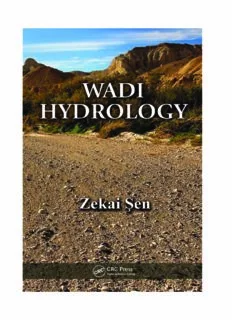
Preview Wadi Hydrology
WADI HYDROLOGY 61542.indb 1 2/15/08 10:53:50 AM 61542.indb 2 2/15/08 10:53:50 AM WADI HYDROLOGY Zekai Şen Istanbul Technical University Turkey 61542.indb 3 2/15/08 10:53:50 AM CRC Press Taylor & Francis Group 6000 Broken Sound Parkway NW, Suite 300 Boca Raton, FL 33487‑2742 © 2008 by Taylor & Francis Group, LLC CRC Press is an imprint of Taylor & Francis Group, an Informa business No claim to original U.S. Government works Printed in the United States of America on acid‑free paper 10 9 8 7 6 5 4 3 2 1 International Standard Book Number‑13: 978‑1‑4200‑6154‑3 (Hardcover) This book contains information obtained from authentic and highly regarded sources Reason‑ able efforts have been made to publish reliable data and information, but the author and publisher cannot assume responsibility for the validity of all materials or the consequences of their use. The Authors and Publishers have attempted to trace the copyright holders of all material reproduced in this publication and apologize to copyright holders if permission to publish in this form has not been obtained. If any copyright material has not been acknowledged please write and let us know so we may rectify in any future reprint Except as permitted under U.S. Copyright Law, no part of this book may be reprinted, reproduced, transmitted, or utilized in any form by any electronic, mechanical, or other means, now known or hereafter invented, including photocopying, microfilming, and recording, or in any information storage or retrieval system, without written permission from the publishers. For permission to photocopy or use material electronically from this work, please access www. copyright.com (http://www.copyright.com/) or contact the Copyright Clearance Center, Inc. (CCC) 222 Rosewood Drive, Danvers, MA 01923, 978‑750‑8400. CCC is a not‑for‑profit organization that provides licenses and registration for a variety of users. For organizations that have been granted a photocopy license by the CCC, a separate system of payment has been arranged. Trademark Notice: Product or corporate names may be trademarks or registered trademarks, and are used only for identification and explanation without intent to infringe. Library of Congress Cataloging‑in‑Publication Data Sen, Zekâi Wadi hydrology / Zekai Sen. p. cm. Includes bibliographical references and index. ISBN 978‑1‑4200‑6154‑3 (alk. paper) 1. Wadis. 2. Hydrology‑‑Arid regions. 3. Rain‑water (Water‑supply)‑‑Arid regions. 4. Groundwater recharge‑‑Arid regions. 5. Water resources development‑‑Arid regions. I. Title. GB561.S46 2008 551.480915’4‑‑dc22 2008000783 Visit the Taylor & Francis Web site at http://www.taylorandfrancis.com and the CRC Press Web site at http://www.crcpress.com 61542.indb 4 2/15/08 10:53:50 AM Dedication Bismillahirrahmanirrahim In the name of Allah the most Merciful and the most Beneficial 61542.indb 5 2/15/08 10:53:51 AM 61542.indb 6 2/15/08 10:53:51 AM Contents Preface....................................................................................................................xiii The.Author................................................................................................................xv Chapter 1 Introduction.........................................................................................1 1.1. General.Overview............................................................................................1 1.2. Arid.Region.Classification...............................................................................2 1.3. Desertification..................................................................................................3 1.4. Droughts...........................................................................................................6 1.5. Climate.Change.Impacts..................................................................................7 1.6. Wadi.Hydrology.............................................................................................10 1.7. Methodological.Distinctions..........................................................................13 References.................................................................................................................14 Chapter 2 Wadi Characteristics.........................................................................17 2.1. General.Overview..........................................................................................17 2.2. Geomorphology.............................................................................................17 2.3. Soil.and.Landforms........................................................................................21 2.3.1. Alluvial.Fans.......................................................................................22 2.3.2. Alluvial.Fills.......................................................................................23 2.3.3. Sand.Dunes.........................................................................................24 2.3.4. Delta.Deposits.....................................................................................25 2.3.5. Coastal.Plain.Deposits........................................................................26 2.3.6. Sabkhah.(Playa)..................................................................................27 2.4. Rock.Environments.in.Arid.Regions.............................................................27 2.5. Drainage.Basin.Features................................................................................28 2.5.1. Drainage.Area.....................................................................................30 2.5.2. Stream.Slope.......................................................................................30 2.5.3. Drainage.Density................................................................................31 2.5.4. Centroid.Length..................................................................................32 2.5.5. Elevation.Features...............................................................................32 2.6. Time.of.Concentration.....................................................................................34 2.6.1. Average.Time.of.Concentration.Derivation........................................34 References.................................................................................................................36 Chapter 3 Rainfall Pattern.................................................................................37 3.1. General.Overview..........................................................................................37 3.2. Rainfall.Features............................................................................................37 3.3. Temporal.Distribution.of.Rainfall.................................................................39 vii 61542.indb 7 2/15/08 10:53:51 AM viii Wadi Hydrology 3.4. Aridity.Index..................................................................................................42 3.5. Accumulative.Rainfall.Curve.(ARC).............................................................43 3.5.1. Rainfall.Intensity–Duration................................................................45 3.6. Intensity–Duration–Frequency.(IDF).Relationship.......................................48 3.6.1. IDF.Curves.and.PDFs.........................................................................48 3.6.2. Study.Area.and.Data...........................................................................50 3.6.3. Basic.Data.Derivation.........................................................................51 3.6.4. Probability.Distribution.Functions.(PDFs).........................................53 3.6.5. Average.Intensity–Duration.Model.....................................................54 3.6.6. Intensity–Duration–Frequency.Curves...............................................55 3.7. Rainy.and.Nonrainy.Days..............................................................................55 3.7.1. Fractal.Dimension.of.Rainy.and.Nonrainy.Durations........................57 3.8. Rainfall.Distribution.Functions.and.Prediction.............................................63 3.8.1. Frequency.Distribution.......................................................................65 3.8.2. Gamma.PDF.Predictions....................................................................67 3.8.3. Application..........................................................................................68 3.9. Spatial.Distribution.of.Rainfall......................................................................72 3.9.1. Classical.Geometric.Weighting.Functions.........................................73 3.9.2. Arithmetic.Average.............................................................................74 3.9.3. Thiessen.Polygon................................................................................75 3.9.4. Isohyetal.Maps....................................................................................76 3.9.5. Percentage.Weighted.Polygon.(PWP).................................................78 3.9.6. Automated.AAR.Calculation..............................................................81 3.9.6.1. Data.and.Study.Area.............................................................81 3.9.6.2. A.Rapid.Areal.Rainfall.Calculation......................................84 3.9.6.3. Volume.Calculations.............................................................88 3.10. Triple.Variable.Drought.Descriptor...............................................................89 3.10.1.Applications........................................................................................92 3.11. Jordan.Climatology........................................................................................94 References.................................................................................................................99 Chapter 4 Runoff and Hydrograph Analysis..................................................103 4.1. General.Overview........................................................................................103 4.2. Hyetograph–Hydrograph.Relationship........................................................103 4.3. Rating.Curve................................................................................................106 4.4. Critics.of.Conventional.Methods.................................................................108 4.5. Infinitesimal.Runoff.Coefficient.(IRC)........................................................109 4.5.1. Comparison.with.Other.Methodologies............................................110 4.6. Hydrograph.and.Unit.Hydrograph.Derivation.in.Arid.Regions..................120 4.6.1. Temporal.Runoff.Change.with.Rainfall...........................................121 4.6.2. Infiltration.Change.with.Time..........................................................122 4.6.3. Hydrograph.Formulation..................................................................125 4.6.4. Standard.Dimensionless.Unit.Hydrograph.......................................126 4.6.5. Comparison.with.Other.Methodologies............................................126 4.6.6. Application........................................................................................129 61542.indb 8 2/15/08 10:53:51 AM Contents ix 4.7. Modified.Snyder.Synthetic.Hydrograph......................................................132 4.7.1. Peak.Floods.in.Arid.Regions............................................................133 4.7.2. Logical.Phase....................................................................................134 4.7.3. Empirical.Phase................................................................................135 4.7.4. Discharge.Adjustment.......................................................................137 4.8. Dimensionless.Unit.Hydrograph.(DUH).....................................................138 4.8.1. Applications......................................................................................140 4.9. Flood.Estimation.in.Ungauged.Wadis.........................................................144 4.9.1. Area-Flood.Discharge.Method.........................................................145 4.9.2. Kinematics.Wave.Method.of.Flood.Hydrograph..............................150 4.9.2.1. Flood.Hydrograph...............................................................154 4.10. Cross-Section.Flood.Discharge....................................................................155 4.10.1.Control.Cross-Sections.....................................................................157 4.10.2.Discharge–Stage.Relationship..........................................................160 4.11. Curve.Number.and.Manning’s.Coefficient.in.Arid.Regions.......................160 4.11.1.Roughness.Coefficient......................................................................163 4.11.2.Soil.and.Rock.Classifications............................................................164 4.13. Flood.Hazards..............................................................................................166 References...............................................................................................................170 Chapter 5 Groundwater Recharge and Evaluation........................................175 5.1. General.Overview........................................................................................175 5.2. Geology.and.Groundwater...........................................................................175 5.3. Groundwater.and.Recharge..........................................................................176 5.3.1. Transmission.Losses.........................................................................177 5.3.2. Types.of.Recharge.............................................................................178 5.3.3. Recharge.Estimation.Methods..........................................................182 5.3.3.1. Direct.Method.....................................................................183 5.3.3.2. Indirect.Method...................................................................183 5.4. Techniques.for.Groundwater.Recharge.Estimation.....................................183 5.5. Chloride.Mass.Balance.(CMB).Methods.....................................................186 5.5.1. Classical.CMB.Method.....................................................................187 5.5.2. Refined.CMB.Method.......................................................................188 5.5.3. Application........................................................................................191 5.5.4. Recharge.Outcrop.Relation.(ROR)...................................................193 5.6. Environmental.Isotopes...............................................................................197 5.7. Depression.Cone..........................................................................................201 5.8. Discharge.Calculation.in.Large.Diameter.Wells.........................................202 5.9. Aquifer.Tests................................................................................................203 5.9.1. Aquifer.Test.Pitfalls..........................................................................206 5.10. Aquifer.Heterogeneity.and.Methods............................................................207 5.10.1.Slope.Matching.Procedure................................................................208 5.10.2.Field.Applications.............................................................................210 5.11. Type.Straight-Line.Method..........................................................................217 5.11.1.Application........................................................................................221 61542.indb 9 2/15/08 10:53:51 AM
Description: